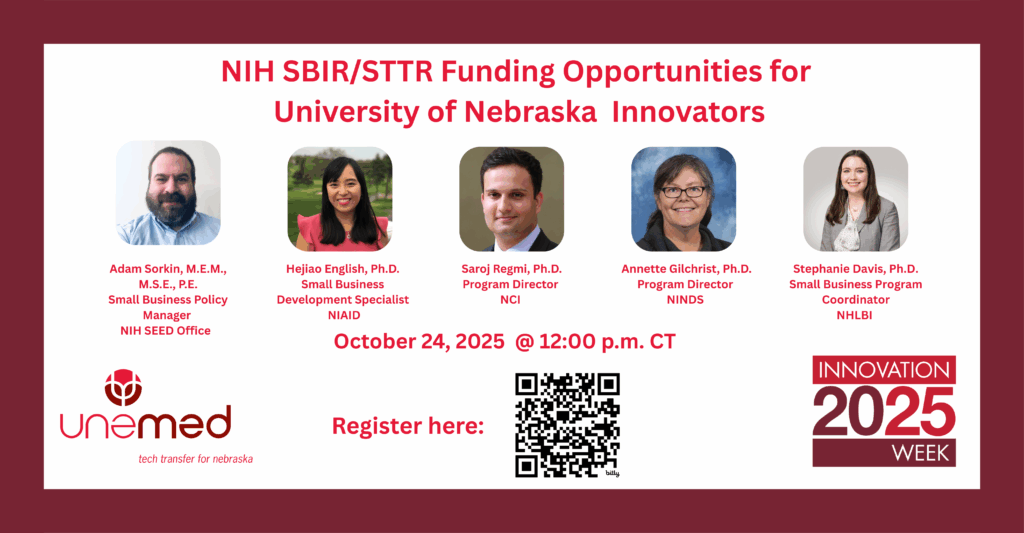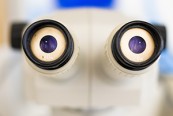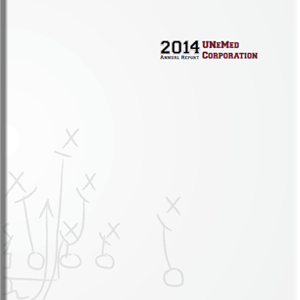OMAHA, Nebraska (October 16, 2025)—The National Institutes of Health and UNeMed will host a virtual discussion about non-dilutive funding opportunities for academic researchers and innovators next week.
Scheduled as a Teams Meeting on Friday, Oct. 24, the planned panel discussion is titled “NIH SBIR/STTR Funding Opportunities for University of Nebraska Innovators.” The event is part of UNeMed’s annual Innovation Week series of events.
Every year the NIH provides $1.4 billion towards early-stage life science companies. Current NIH program staff will share how those funds can be accessed by innovative Nebraskans through the small business (SBIR/STTR) grant programs. Attendees will hear about scientific priorities and funding opportunities at the following institutes, centers, and offices:
- NIH Small Business Education and Entrepreneurial Development (SEED) Office
- National Institute for Neurological Disorders and Stroke (NINDS)
- National Institute for Allergy and Infectious Diseases (NIAID)
- National Cancer Institute (NCI)
- National Heart Lung and Blood Institute (NHLBI)
A moderated Q&A session with the speakers will follow presentations. To register, go here.
Attendees are also encouraged to book one-on-one meetings with NIH staff to discuss their projects after the session using this link.
Planned speakers are Adam Sorkin, Saroj Regmi, Hejiao English, Annette Gilchrist, and Stephanie Davis.
Adam Sorkin, M.E.M., M.S.E., P.E. has over a decade of experience championing small business research and development. He previously supported Small Business Programs and intramural technology transfer activities at the National Institute of Allergy and Infectious Diseases. Prior to joining NIH, Adam led R&D, strategy, and fundraising efforts of start-ups developing novel regenerative medicine and anti-infective applications. Adam has served as the Small Business Policy Manager in the NIH Small Business Education and Entrepreneurial Development (SEED) Office since 2022.
Saroj Regmi, PhD, is a Program Director at the National Cancer Institute’s Small Business Innovation Research (SBIR) Development Center. In his role, he provides oversight, guidance, administers funding, as well as offers networking assistance for small businesses to accelerate the translation of cancer-related technologies. Saroj conducted his postdoctoral work at NIH using CRISPR/Cas9-based approaches to study cellular processes. He received his PhD in molecular and cellular biology from Dartmouth Medical School.
Hejiao English, PhD, is a Small Business Development Specialist in the Office of Research Training and Special Programs (ORTSP), Division of Extramural Activities (DEA), National Institute of Allergy and Infectious Diseases (NIAID), NIH. In her current position, Dr. English established, coordinates, and oversees the NIAID Small Business Applicant Assistance Program (AAP) that provides proposal development assistance and guidance to NIAID SBIR/STTR applicants in need. Prior to NIAID, Dr. English was an Invention Development and Marketing Specialist at NCI Technology Transfer Center (TTC), where she conducted portfolio and market landscape analysis for multiple cancer therapeutics, diagnostics, and devices inventions developed by NCI intramural investigators. Dr. English received post-doctoral research training at the Laboratory of Molecular Biology (LMB) in NCI in antibody engineering and cancer immunotherapy. She holds a PhD in Biochemistry from Boston University, School of Medicine, Boston, MA.
Annette Gilchrist, PhD joined NINDS in 2022 where she oversees a portfolio of small business innovative research (SBIR) and small business technology transfer (STTR) projects. Prior to NINDS, Dr. Gilchrist was an Associate Professor at Midwestern University, where she taught pharmacogenomics and medicinal chemistry of anticancer drugs. She co-founded MyGenomeRx, a company that uses the results of at-home genetic tests to identify potential drug-gene interactions. She also co-founded Cue Biotech and Caden Biosciences, companies based on a novel approach to identifying compounds based on their ability to alter the interface between G protein coupled receptors and G proteins. This approach resulted from her postdoctoral work at Northwestern University and the University of Illinois – Chicago and has had multiple patents issued. Dr. Gilchrist received her B.S. in Biology from the University of Central Oklahoma, her M.S. in Biochemistry from the University of Connecticut, and her PhD from the University of Connecticut Health Center in Immunology where she worked on the tyrosine phosphatase PTP1C.
Stephanie Davis, PhD received her B.S. in Biochemistry and Molecular Biology in 2012 from Florida Southern College. She received her M.S. in Medical Sciences (2015) and her PhD in Molecular Pharmacology (2016) from the University of South Florida. Stephanie was a postdoctoral scholar at the University of Kentucky in the Department of Neurology. In addition to her postdoctoral appointment, she also interned part-time with the UK Office of Technology Commercialization from January to July 2019. Before joining the Innovation Office, Stephanie was selected for the 2019-2020 Executive Branch AAAS Science and Technology Policy Fellows Program, where she served as a Program Manager in the National Institute on Aging Office of Small Business Research. She has served as the National Heart Lung and Blood Institute Small Business Program Coordinator since December 2020.
Innovation Weeks events are free and open to the public, except the Awards reception, which is by invitation only. Further details about all Innovation Week events can be found on UNeMed’s Innovation Week page.











